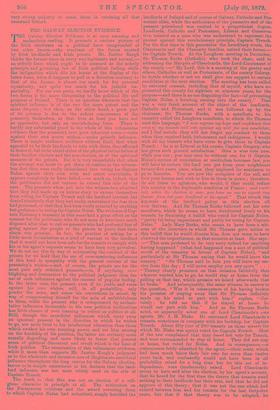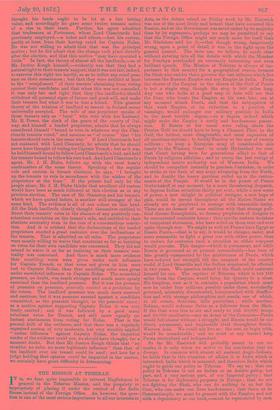THE GALWAY ELECTION EVIDENCE.
influence throughout the long canvas for the Galway election, leaves us in simple amazement at his decision that the land- lord influence was not most widely used on the side of Captain Trench.
The truth is, that this was not an election of a reli- gious character in principle at all. The arbitration on the Portacarron evictions and the award reversing them to which Captain Nolan had submitted, simply horrified the very strong majority to assist them in retaining all that landlords of Ireland and of course of Galway, Catholic and Pro- remained behind.
testant alike, while the enthusiasm of the peasantry and of the peasant priesthood was excited in a proportional degree. Landlords, Catholic and Protestant, Liberal and Conserva- tive, insisted on a man who was understood to represent the protest against this revolutionary principle, Captain Trench. For the first time in this generation the hereditary rivals, the Clanricarde and the Clancarty families, united their forces,— for Captain Trench. At the Loughrea meeting in December, Sir Thomas Burke (CatholiC), who took the chair, said in addressing the Marquis of Olanricarde, the Lord-Lieutenant of the county :—" My Lord, this is a meeting of the gentry and others, Catholics as well as Protestants, of the county Galway, to decide whether or not we shall give our support to certain candidates at the nest election. The meeting has been called by universal consent, including that of myself, who have re- presented this county for eighteen or nineteen years, for the purpose—and there is no use disguising the fact—of preventing Captain Nolan, a humbug, coming into the county." That was a very frank account of the object of the landlords, Catholic and Protestant, and it was followed up by the chairman, Sir Thomas Burke, with a manifesto to his tenantry called the Loughrea manifesto, in which Sir Thomas used this language, "I now express my hope mid confidence that none of my tenants will vote against my will for any candidate, and I feel certain they will not forget my conduct to them when they required both forbearance and indulgence. I would wish all my tenants who have votes to give them to Captain Trench ; he is as Liberal as his cousin, Captain Gregory, who has given such general satisfaction.' Give a wise vote now, while you can ; you may soon be without one, for if Captain Nolan's system of restoration or restitution becomes law, you will have to restore the land you got from your neighbours twenty-five years since, when they implored for assistance to go to America. You are now the occupiers of the soil, and love your homes and wish to live in them in peace ; therefore, do not listen to agitators, who would, if they could, reduce this country to the deplorable condition of France ; and recol- lect, when the election is over, you have no one to expect any favour from but your landlord or his agent." That struck the key-note of the landlord policy in this election all over Galway. And Sir Thomas Burke followed out his own manifesto, which he seems to have distributed freely to his tenants, by dismissing a bailiff who voted for Captain Nolan, "partly for being impertinent and partly for voting for Captain Nolan." Lady Mary Burke, who seems to have been a wit- ness of the interview in which Sir Thomas gave notice to this bailiff that he would dismiss him, does not seem to have observed the impertinence, on that occasion at least. She says : —" This man professed to be very sorry indeed for anything having happened" (what had happened was a sort of political revolt of the tenantry in favour of Captain Nolan), "and particularly at Sir Thomas saying that he would leave the country." "Sir Thomas said to him you will leave my ser- vice from this day ; I will never employ you any more." . . . "Tierney clearly promised on that occasion faithfully that whoever wanted him to go, he would stay at home from the polling on that day, which promise we heard afterwards that he broke." And subsequently, the same witness, in answer to the question, "Was it in consequence of his having broken his promise of staying away that Sir Thomas definitely made up his mind to part with him ?" replies, " Cer- tainly ; he told me that if he stayed at home he would not part with him." And as Sir Thomas Burke acted, so apparently acted one of Lord Clanricarde's own agents, Mr. J. H. Blake. He canvassed Lord Clanricarde's tenants, sometimes in company with his lordship, for Captain Trench. About fifty (out of 200 tenants on those estates for which Mr. Blake was agent) voted for Captain Trench. Most of the rest complained that they dared not vote for Trench, and were recommended to stay at home. They did not stay at home, but voted for Nolan. And in consequence,—a consequence fairly admitted by the agent,—their rents, which had been much below their fair rate for more than twelve years back, and confessedly would not have been in all probability raised for a long time but for this act of in-
dependence, were (moderately) raised. Lord Clanricarde seems to have said after the election, by his agent's account, that he heard for the first time the theory that tenants owed nothing to their landlords but their rent, and that he did not approve of this theory ; that it was not the one which had existed between him and his tenants for the last forty-five years, but that if that theory was to be adopted, he
thought his lands ought to be let at a fair letting value, and accordingly he gave some twelve tenants notice of a rise in their rents. Further, his agent admitted that tradesmen at Portumna, whom Lord Clanricarde had previously employed,—a baker and others,—lost his custom, partly at least, from their having voted for Captain Nolan. He was not willing to admit that that was the principal motive ; but he did admit that the change took place directly after the election, and that this motive "may have operated a little." In fact, the theory of almost all the landlords,—as of Mr, Justice Keogh himself, —evidently was that they had a natural right to their tenants' support, that it was not fair, indeed, to exercise this right too hardly, so as to inflict any cruel pres- sure on their consciences ; but that they were entitled at least to the " compliment " of their tenants' abstaining from voting against their candidate, and that when this was not conceded, it was only fair and right that they (the landlords) should withdraw all personal signs of favour and good-will, and make their tenants feel what it was to lose a friend. This general theory of the relation of landlord to tenant in Ireland seems universally accepted. The wife of one proprietor speaks of those tenants only as " loyal " who vote with her husband. Mr. R. Power, the clerk of the peace of the county of Gal- way, and himself a landed proprietor, admits that he always considered himself "bound to vote in whatever way the Clan- ricarde tenants voted," and assumes as "of course" that "his tenants should vote in the same way." If Lord Clanricarde had not coalesced with Lord Olancarty, he admits that he should never have thought of voting for Captain Trench ; but as it was, he held himself bound to follow Lord Clanricarde's lead, and held his tenants bound to follow his own lead. And Lord Clanricarde's agent, Mr. J. H. Blake, follows up with the most hearty confirmation of the same theory. Speaking of the regular rule and custom in former elections, he says, "I brought up the tenants to vote in accordance with the wishes of the proprietors at the time." If the priests had only let the people alone, Mr. J. H. Blake thinks that excellent old custom would have been as much followed at this election as at any previous election. The ease of Mr. Staunton and his tenants, which we have quoted before, is another still stronger of the same kind. The evidence is all of one colour on this head. All the Irish landlords clearly thought themselves entitled to direct their tenants' votes in the absence of any positively con- scientious conviction on the tenant's side, and entitled to their absolute neutrality even in the case of a conscientious convic- tion. And it is evident that the declarations of the landed proprietors exerted a great restraint over the inclinations of the tenants. That is admitted on all sides. The proprietors were mostly willing to waive that constraint so far as insisting on votes for their own candidate was concerned. They did not intend to waive it so far as insisting on their tenants' neu- trality was concerned. And there is much more evidence that unwilling votes were given under such influence for Captain Trench, or that votes not given to him were lost to Captain Nolan, than that unwilling votes were given under sacerdotal influence to Captain Nolan. The sacerdotal pressure, no doubt, was much stronger and much more openly exercised than the landlord pressure. But it was the pressure of peasants on peasants, generally invited as a protection hy the voters. The landlord pressure was much more reserved and cautious, but it was pressure exerted against a candidate committed, as the peasants thought, to the peasants' cause ; as a motive against supporting Captain Nolan it was very freely exerted ; and it was followed by a good many reluctant votes for Trench, and still more equally re- luctant abstinences from voting for Nolan. That is the general drift of the evidence, and that there was a regularly organised system of very moderate, but very steadily applied "undue influence" against Captain Nolan, the impartial reader of the evidence could not, we should have thought, for a moment doubt. But then Mr. Justice Keogh thinks that "no steadier, no safer, no more legitimate influence" than that of the landlord over his tenant could be used ; and how far a judge holding that opinion could be impartial in the matter, we certainly have great difficulty in determining.



































 Previous page
Previous page